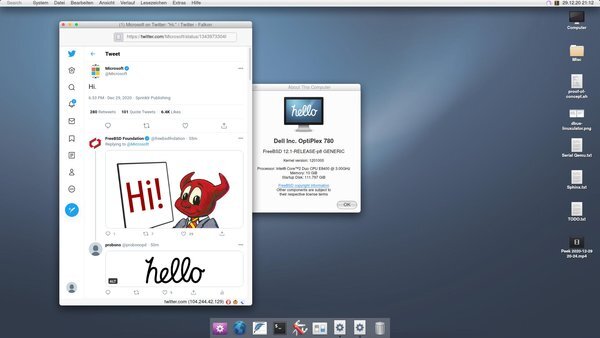
A screenshot of the FreeBSD-based hello operating system.
I haven’t devoted much of MidRange to tech just yet, in part because so much of my other writing is focused on technology, but I just wanted to spend a moment talking about the cool work being done by German developer Simon Peter on what feels like a new approach for an alternative operating system.
Peter is currently busy putting early touches on hello, a new variant of FreeBSD that looks a bit like old-school Mac OS X, but really aims to capture the feel of of old-school desktop operating systems like the original MacOS and, say, Geoworks. And part of the reason why it might be worthy of people’s time is that it seems to have a broader philosophy behind it.
It seems strange to consider, but the reason why it seems like it has potential to be something really cool and interesting is because of the decision to actively not use Linux, which is usually the starting point for where new desktop operating systems go. Linux is great, and there are a lot of cool elements to it, but the community-based nature of it has a tendency to force a bit of complexity into the final product, as it must maintain a certain level of support to make everyone happy.
The result is that, before people even get started with a computer, they often have to set it up to their personal preferences, and on operating systems such as Linux, the process can get incredibly complex. (Example: I had to add a config file to my installation of Pop_OS today to make the touch interface on my Wacom drawing tablet not default to natural scrolling. Annoying!)
By using the less-dominant FreeBSD (which shares some lineage with MacOS, admittedly), Peter has put the operating system in a position where it can incubate a little more with less outside influence getting in the way, as lots of people try to shape what the project should look like. Some of those comments are starting to appear, but they feel like they can be brushed aside thanks to the set philosophy.
[embed https://www.youtube.com/watch?v=PlPTVbhrKYM\]
Last summer, Peter wrote a blog post titled “Bring back the ease of ’80s and ’90s personal computing,” which effectively argued for a more philosophical approach to building an operating system interface. He expressed frustration with the wide array of possible configurations that can happen in modern operating systems.
“Too many things to be configured, and everything that can be configured can go wrong,” he wrote. “Back in time when things were easy, everything could be done by drag-and-drop in the file manager, without other tools. Contrast this with today: Too many things cannot be achieved by the file manager anymore.”
This approach is a driving factor behind hello, which is still only a few months old, but has been driven in large part by philosophical discussions just as much as pushing around code.
This is no hobby operating system, either, at least not in the sense that Peter seems to be building it for himself. Speaking to The Register, he emphasized that the goal is to make a simplistic operating system that regular users will feel comfortable with.
"There is no set date for 1.0,” he said. “The objective for 1.0 is roughly that you can put it on a casual user's 10-year-old Mac and have them use it for basic tasks without being all too confused.”
I have gained great appreciation for Linux’s sheer flexibility, but one thing that has really been missing from many open-source implementations is something that makes thoughtful decisions for the end user, discouraging heavy customization because it just works. (There are examples, to be fair: Chrome OS probably fits the bill, though it’s likely not open enough; Elementary OS gets partway there.)
It will be interesting to give hello a serious try, as well as to watch its noble goals play out. Personally, I can’t wait.
Time limit given ⏲: 30 minutes
Time left on clock ⏲: timer goes off

